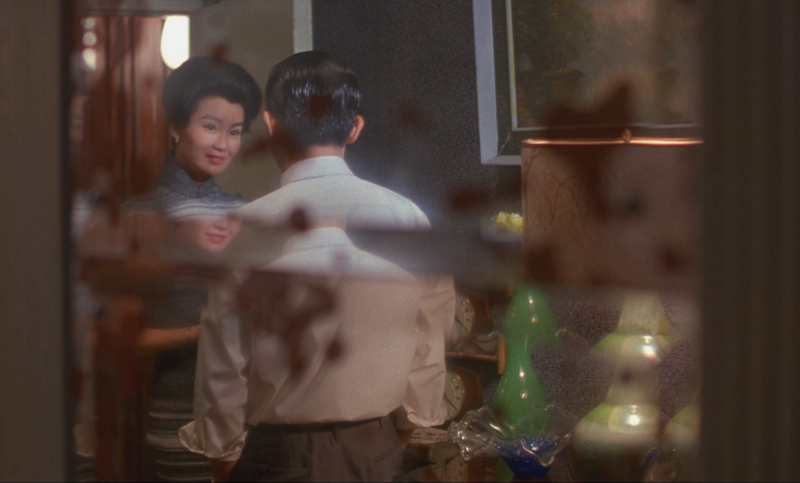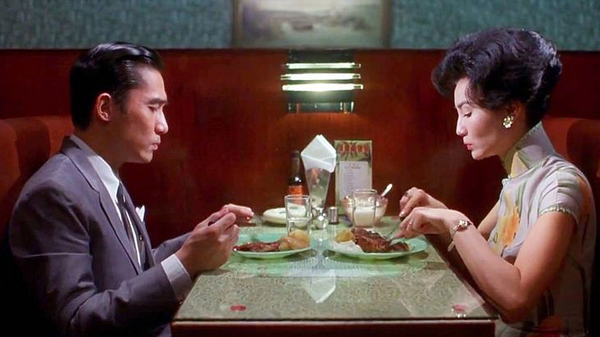Warning: This article contains spoilers for In The Mood For Love (2000).
“He remembers those vanished years. As though looking through a dusty window pane, the past is something he could see, but not touch. And everything he sees is blurred and indistinct.” —In The Mood For Love, 2000
This quote perfectly summarizes the journey this movie provides: blurred and indistinct like being taken through a memory as each event is recalled in erratic fragments.
Recently, In the Mood for Love, a movie produced in 2000, has begun to resurface on the internet as a classic, melancholy East Asian film. Produced and set in Hong Kong, it focuses on the year 1962, starring the famed Tony Leung (Mr. Chow) and Maggie Cheung (Mrs. Chan) as they incidentally reside in the same apartment, fated to cross paths. Within their monotonous routine, they share a single similarity that incites their relationship: the absence of their working spouses. However, the more they spend time together, the closer they are to gradually learning that their spouses are cheating on them with each other. Due to this vacancy of their loved ones, they soon begin to find companionship within one another, attempting to steer clear of any sensual emotions as they vow for their relationship to never resemble their partners’. In the cramped apartments of Hong Kong, we, as watchers, observe how these victims of infidelity come to handle the pain of the truth.

How is this plot of romance, already predicted for failure, able to captivate its audience so well? Directed by the celebrated Wong Kar-Wai, the techniques and meanings embellished within this film, as well as the actors’ skill, is what makes this movie both tragic and exciting. Apart from the frenzy of enrapturing colors and the beauty of Chinese fashion, this movie may at first seem boring. We first begin to see the protagonists going about their daily lives, which is captured in a rather repetitive way as the same angle, scene, location, and music are reintroduced multiple times. This may seem like a product of poor filming; however, these scenes recur with a purpose: to display how mundane the protagonists’ lives were, and to have the viewers experience the same monotony. As these fixed backgrounds reappear timely, we then assert our focus onto what truly changes: the feelings of the two lead characters.
After discovering that their loved ones are indulging in an affair, Mr. Chow and Mrs. Chan vow to never become like them; however, this restraint only further incites their desire for one another. What appealed to me was the simplicity of the scene where the affair was brought to light. Through a dinner conversation, this realization was rather uneventful as it was founded through the mere relation of the ties and bags they each purchased for their spouses. Normally, after such a discovery, one would spiral into a turmoil of betrayal and lost love, but instead, they decided to fully comprehend how this affair spurred into action. They then begin to re-enact scenes of possible encounters that may have sparked their spouses’ infidelity, never fully accepting the truth of it and thus entertaining a fantasy between them. From this complicated relationship, they begin to rely on each other, diverting themselves from life’s stagnation and fulfilling each other’s emotional vacancy in the place of their partners. This fantasy they revel in is just an excuse to not face the truth. Soon, as they develop a budding love that is never pursued, their delusion comes crumbling down and they are forced to acknowledge the fact that they have ceased to truly be their partner’s loved ones. This tragic truth weighs down on them in an instant and this turning point is what gives the movie its melancholy genre.

Even though both protagonists are drawn to each other by a sort of intimacy, they chose not to pursue it due to the societal norms of 1960’s Chinese culture. Privacy is a state unknown to the Chinese as Mrs. Chan and Mr. Chow reside in an apartment, often cramped with aunties and uncles that enjoy spreading gossip over a game of mahjong. In one scene, Mrs. Chan is even approached by the landlord to question her about her dubious relationship with Mr. Chow. These beliefs registered in the Shanghainese community are a possible reason for the film’s unique ubiquity of obscured frames. Almost every scene is filmed with an object acting as a medium to the camera: the viewers are watching through mirrors, windows, or the structure of a narrow hallway. This acts as a symbolism of their relationship: vague and unfulfilled, yet always present. It also seems like the protagonists are being watched: a representation of the lack of privacy in Chinese culture.
After the two lead characters separate, never fulfilling their evident longing for one another, the distant memory of what could’ve been lives on in the ghost of missed interactions. After years have passed by, Mrs. Chan and Mr. Chow are wistful and decide to visit the reminders of their past. With these visitations, they manage to just avoid one another, failing to reconcile. As Mrs. Chan stops by Mr. Chow’s new apartment unknowingly, he returns to find a single cigarette, smoke still billowing from its charred tips: a remnant of his past. But, he never chooses to pursue her. This is what their relationship is now sustained on and has been since the very beginning: missed opportunities. It always rotated around the mere possibility of a connection, but never the connection itself.
Wong Kar-Wai’s In The Mood For Love is a subtle, beautiful, and tragic representation of the consequences when choosing to delay the reality of truth and to, instead, conceal yourself in a fantasy created for its avoidance. Not only that, but he manages to maintain this heart-breaking atmosphere while showcasing the beauty of culture in 1960’s Hong Kong, pulling us into its trance. The mesmerizing shots, deep vivid colors, and calm quality of the film provide a sense of nostalgia and unawareness to time that many find alluring, and will continue to live out its legacy as one of Asia’s most distinguished films.